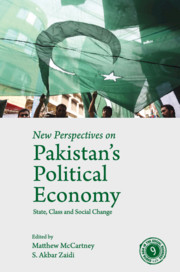Book contents
- Frontmatter
- Contents
- Preface
- Introduction
- 1 In a Desperate State: The Social Sciences and the Overdeveloped State in Pakistan, 1950 to 1983
- 2 The Overdeveloped Alavian Legacy
- 3 Institutions Matter: The State, the Military and Social Class
- 4 Class Is Dead but Faith Never Dies: Women, Islam and Pakistan
- 5 The Amnesia of Genesis
- 6 The Political Economy of Uneven State-Spatiality in Pakistan: The Interplay of Space, Class and Institutions
- 7 An Evolving Class Structure? Pakistan's Ruling Classes and the Implications for Pakistan's Political Economy
- 8 The Segmented ‘Rural Elite’: Agrarian Transformation and Rural Politics in Pakistani Punjab
- 9 Ascending the Power Structure: Bazaar Traders in Urban Punjab
- 10 Democracy and Patronage in Pakistan
- 11 From Overdeveloped State to Praetorian Pakistan: Tracing the Media's Transformations
- About the Contributors
- Index
3 - Institutions Matter: The State, the Military and Social Class
Published online by Cambridge University Press: 26 April 2019
- Frontmatter
- Contents
- Preface
- Introduction
- 1 In a Desperate State: The Social Sciences and the Overdeveloped State in Pakistan, 1950 to 1983
- 2 The Overdeveloped Alavian Legacy
- 3 Institutions Matter: The State, the Military and Social Class
- 4 Class Is Dead but Faith Never Dies: Women, Islam and Pakistan
- 5 The Amnesia of Genesis
- 6 The Political Economy of Uneven State-Spatiality in Pakistan: The Interplay of Space, Class and Institutions
- 7 An Evolving Class Structure? Pakistan's Ruling Classes and the Implications for Pakistan's Political Economy
- 8 The Segmented ‘Rural Elite’: Agrarian Transformation and Rural Politics in Pakistani Punjab
- 9 Ascending the Power Structure: Bazaar Traders in Urban Punjab
- 10 Democracy and Patronage in Pakistan
- 11 From Overdeveloped State to Praetorian Pakistan: Tracing the Media's Transformations
- About the Contributors
- Index
Summary
INTRODUCTION
In his thoughtful and expansive essay, S. Akbar Zaidi (2014) invites us to rethink and destabilise the ‘statist bias’ in the political economy scholarship on Pakistan, considering the significant transformation in both state and society dynamics in recent decades. He does not claim to offer an alternative theory; his intentions are more modest: to get the intellectual ball rolling by highlighting an important weakness in the literature. Specifically, Zaidi (2014) seeks to emancipate social science theorising about the Pakistani state from what he thinks is the wilted straitjacket of Alavi's (1972) ‘overdeveloped state’ thesis.1
Zaidi (2014) rightly considers Alavi's analysis to be dated and static. Drawing on Akhtar's (2008) critical recent re-examination of Alavi, he believes the biggest flaw in the overdeveloped state formulation is its ‘inability to examine – or even understand and recognise – social forces’ (Zaidi 2014:48). Zaidi (2014) does concede that Alavi's thesis may have been relevant in the past, but is losing relevance given the increasing ‘fracturization’ of state authority in Pakistan, with changes in the social structure, and the concomitant rise of violent non-state actors.
Along the way, Zaidi (2014) advances several bold and important claims. First, he urges scholars to formulate a theory of the state that integrates the complex social processes that are feeding into and modifying the nature of state–society relations in Pakistan. Some of these processes are ‘[t]he growth of urbanisation, of a middle class, and of a hugely buoyant informal sector, and the breakdown of state authority and of state institutions’ (Zaidi 2014:53). Second, he believes that the military is no longer the domineering Godzilla that it once was. Instead, newer centres of power, such as the higher judiciary and private electronic media, as well as mainstream political parties, have begun to contest its domination (understood here as the recurrent use of violence, threats and other means to make others do what they otherwise would not do). While by no means a decisive shift, Zaidi (2014) believes this friction and resistance is important to recognise in our thinking about civil–military relations. Third, Zaidi complains that scholars and intellectuals have abandoned the study of class in favour of institutions, which in his neo-Marxian view, are primarily ‘multi-class’ entities dedicated to preserving capitalism. Since institutions (and other political actors) exist to reproduce the capitalist system, he casts doubt on the utility of institutions as independent or explanatory variables.
- Type
- Chapter
- Information
- New Perspectives on Pakistan's Political EconomyState, Class and Social Change, pp. 75 - 92Publisher: Cambridge University PressPrint publication year: 2019
- 1
- Cited by



